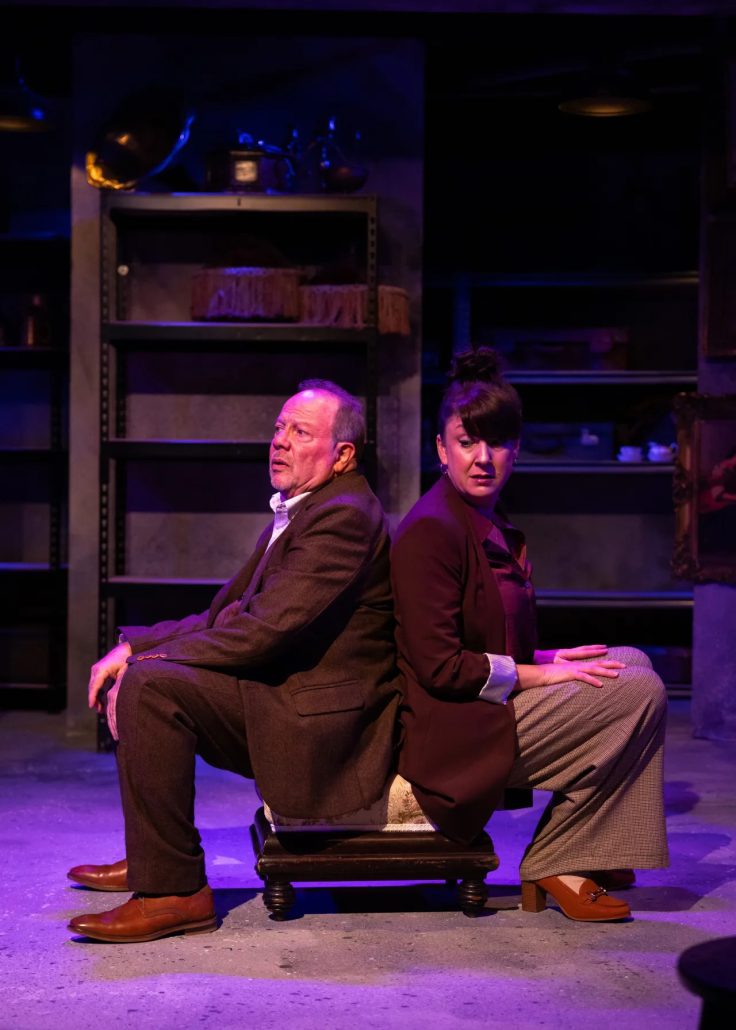How do you tell a story—in three dimensions, on a stage, with actors and movement and lighting and sound—that is primarily about a woman researching her past? The answer is not obvious. The action of Andrea Stolowitz’s “The Berlin Diaries,” running at Theatre Lab at FAU through Dec. 10, is the stuff of theatrical rigor mortis: speaking to archivists; scouring databases and history books; following paper trails, alone at a desk, until the wee hours of the morning.
The solution, in the case of the play’s world-premiere production directed by Matt Stabile, is to jettison the guardrails of the traditional onstage memoir, and to develop a structure that is experimental, and that regularly challenges both its actors and its audience. “The Berlin Diaries” cannot succumb to tedium, because it’s constantly mutating in front of us, keeping us on our toes.
For one thing, both actors, Niki Fridh and Avi Hoffman, portray Stolowitz herself, an acquired conceit that can take some getting used to. They are genderless and shapeshifting, one person and many people, finishing each other’s sentences as two sides of Stolowitz when they’re not embodying some 16 other figures that enter her life over the course of her research.

The plot, such as there is one in a play this dramaturgically unconventional, involves a diary that Stolowitz’s great-grandfather kept during Nazi Germany, and that is bequeathed to her in the mid-aughts. It takes Andrea some eight years to finally delve into the words, in yellowing German, before realizing that the diary could have both personal but professional implications. She receives a grant to write a play based on its revelations, which she needs to discover on her own, through a residency in Berlin, where she begins an exhaustive period of study that culminates in buried secrets both sobering and hopeful.
“The Berlin Diaries” is performed and staged with industry and creativity. Alyiece Moretto Watkins’ scenic design is a veritable storehouse of memories and knickknacks both universal and culturally specific—framed photographs, menorahs, clocks, a gramophone, a typewriter, weathered suitcases—scattered on shelves among contemporary file boxes, the past and present commingling just as they do in Stolowitz’s work. Eric Nelson’s deft lighting cues place us where we need to be, whether we’re journeying into the pages of the diary or following Stolowitz through the snow-covered streets of 21st century Berlin. “The Berlin Diaries” was adapted into an audio drama during the pandemic, and vestiges of that medium still exist in the fully staged production; this is theatre of the mind, with only subtle visual assists.
As genealogists and gatekeepers and Holocaust survivors and family members both living and long-dead, Fridh and Hoffman embody multiple personalities and dialects, from German to South African, switching characters with such haste that audiences may need a second to catch up. The transitions are mostly smooth, and are certainly convincing, but for what it’s worth, they do not present with the illusion of effortlessness. The performances look like work.
While Hoffman is as much Stolowitz as Fridh, it’s the latter actor who brings the playwright’s pursuit to its most vivid life, anchoring her expedition into the dusty catacombs of history with a sense of humor as well as lyricism. Hoffman is at his strongest in the secondary character work, with a deeply felt immersion into the diarist himself, embodied with a hunched posture and an authentic bilingual delivery. Both actors rise to the challenge of creating memorable quirks out of characters only seen for brief moments, such as Hoffman’s portrayal of Stolowitz’s uncle David, perennially fidgeting with a pen while sidestepping his niece’s pointed questions about the gaps in their lineage.
If “The Berlin Diaries” is missing something, it’s a sense of external conflict that is the backbone of much great theatre. There are no real antagonists here, with the central struggle existing within Stolowitz, as she uncovers information that reshapes her family’s past. A mystery play and a memory play, it’s an intellectual stimulant more than a “dramatic” one, and its overarching theme goes back to the slipperiness of the performances. The actors’ abrupt code-switching seems to suggest that, among the Jewish diaspora, we may seem like separate people, but we’re all one. Stolowitz’s story is the story of the Jewish people post-World War II, of family trees damaged and nearly felled by genocide, of scattered connections and hidden linkages just waiting to be uncovered.
“The Berlin Diaries” is at Theatre Lab at FAU, 777 Glades Road, Boca Raton, through Dec. 10. Tickets cost $35 to $45. Call 561/297-6124 or visit fauevents.com.
For more of Boca magazine’s arts and entertainment coverage, click here.







